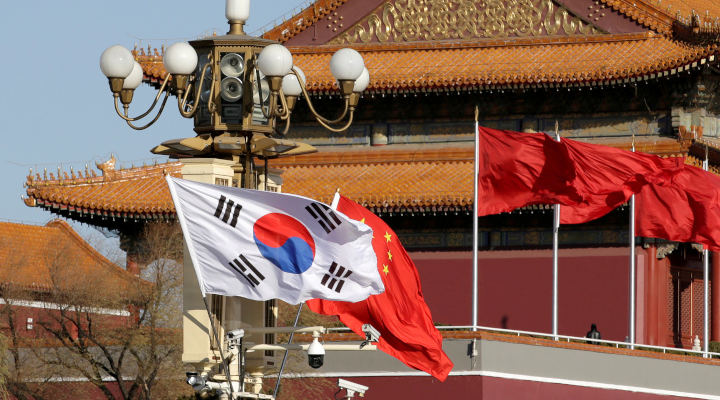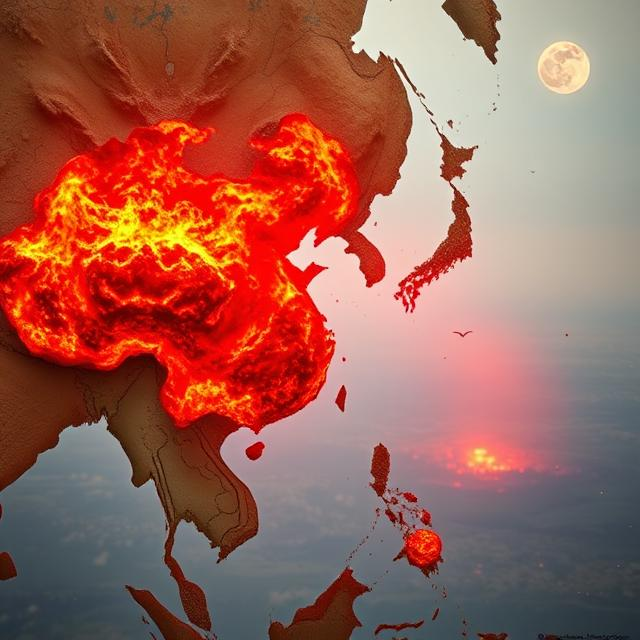
In theory, it is a peninsula, but actually, for all practical purposes, it is an island. South Korea is separated from the rest of the Asian continent by its intractable half-brother to the North, making any land contact with its neighbors impossible.
The gap between the reality (being an island) and the theoretical aspiration (being a peninsula) is compounded by being one of the world’s wealthiest and most dynamic locations, bordering one of the most backward and stagnant places globally, its northern half-brother.
This reality makes the Korean peninsula one of Asia’s most dangerous flash points for future strains.
Tempest on the South Korean Island
Tension is on the rise around China. Saber rattling has become frequent around Taiwan, the island de facto independent but, in theory, part of One China. Strategists’ risk assessments consider the possibility of a clash around Taiwan because the PLA might attempt to invade the island.
There are also risks of skirmishes that could get out of control in the contested waters of the South China Sea between China, Vietnam, the Philippines, Malaysia, and Indonesia. A fight that gets out of hand could also start in the high altitudes of the Himalayas between Chinese and Indian troops. Yet, the North Korean scenario could be the most significant jeopardy.
It is impossible to assess Chinese intentions on all these borders. However, a war in the Korean peninsula could be less risky and more advantageous to Beijing in the present situation.
If North Korean forces were to start a bombardment of Seoul and move infantry and tanks over the ceasefire line, it could procure the most significant damage to the Western world with the least pain to China.
The start of a conflict in South Korea could cause the collapse of the South Korean financial system, which in turn could trigger the crash of stock exchanges worldwide. Unlike 70 years ago, at the time of the Korean War, South Korea is a crucial component of global wealth creation, and an attack on Seoul could spark a financial tsunami worldwide.
It would have the extra benefit of forcing an engagement of the American troops stationed there while not engaging Chinese troops directly.
Of course, such a move would put the Pyongyang regime at risk, but North Korean leader Kim Jong-Un might be tempted to action if goaded by Beijing or in a moment of total miscalculated madness.
None of these scenarios are impossible, looking at the history of North Korea, and as tension builds up around North Korea and Beijing, either side might be tempted to get out of the actual or perceived encirclement and do something crazy for crazy returns.
Unlike any other theater, a war there, as we saw, could be reasonably safe for China. Chinese troops would risk their lives in all different scenarios, whereas Americans could take a backseat.
After a possible attack, North Korea could try to bargain its way out of the mess and hope to bolster a very precarious domestic situation.
The point is not to see if Beijing or Pyongyang will dare to move on South Korea. After the irrational and unreasonable Russian attack on Ukraine, only considering rational and reasonable calculations can’t be enough. Most of the world thought Russia would never attack Ukraine because it was wild, yet it happened. Therefore, one must assume Kim, far more irrational and unreasonable than Russian President Vladimir Putin, could move on South Korea. Its present nuclear and missile build-up could point in that direction.
Moreover, a land attack and a bombardment on Seoul, limited in the hope of some later bargaining, is more reasonable than trying a landing on Taiwan or an engagement with enemy fleets in the South China Sea, or a significant clash with India.
An attack on Taiwan is most likely to fail. Landings are the most dangerous military maneuvers; they have often been botched. A more significant missile attack on Taiwan could entail a more extensive retaliation from the United States and Japan, keen on preserving the island’s political existence.
A clash with the Vietnamese or the Philippine fleets in the South China Sea could spur US intervention, and its navy still far outguns the Chinese navy.
A large conflict with India may have its rewards because China is militarily much more assertive than India along the border; however, politically, it would definitely poison the atmosphere between the two Asian giants.
A large but possibly limited war between the two Koreas could be different. China could deny its involvement and put the blame only on crazy Kim. Yet meanwhile, China could show its power in the region and hope to seed anxiety in the regional hostile alliance. Thus, it could give Beijing greater room for maneuvering.
Chinese bind
It’s not essential to assess if these are Beijing’s intentions. There are enough material elements that could feed suspicion on Beijing’s role as Pyongyang’s puppeteer.
Therefore, given this perception, all present North Korean military build-up could also be blamed on China for its inability to restrain the neighbor. After China supported the Russian invasion of Ukraine, Beijing can ill afford suspicions about its role with Pyongyang, especially without any sure reward from a possible war.
It puts China in a bind. China may want to use North Korea to keep South Korea, Japan, and the United States at bay. However, its ability to distance itself from Pyongyang at any given moment puts Beijing in a corner. It could be blamed for many of Pyongyang’s actions.
The United States, South Korea, and Japan require China’s deeper involvement in the North Korean quandary. China might be unwilling to follow through because it has no interest in improving the life of these three countries. At the same time, tensions with China keep piling up. Still, the war scenario and its unfathomable implications put China on the spot.
Therefore, even only a war scenario on the Korean peninsula creates tension in North Asia and hazards with China.
A linear way forward would be to restart the six-party talks, press North Korea to stop its nuclear and missile build-up, and help to find a peaceful solution for the future of this rump country. Still, if China helps to solve North Korea’s problems, it possibly won’t translate into easing its general situation; if it doesn’t help, it will help to create even more tension for China all around its borders.
China might have chosen to ease the tension cautiously.
At the latest Pyongyang grand event, the July 27 commemorations of the war’s end 70 years ago, Beijing’s delegation was low-key compared to Russia’s, which sent its Minister of Defense Sergei Shoigu over. But this may not be enough. Kim, with or without China’s support, has been trying to wangle his way into the limelight by showing off his latest military toys, and it muddies Beijing’s intentions, making the world suspect that the Chinese like its neighbor’s posture.
Brinkmanship here could become very difficult to manage. The communists, ruling Beijing, and the heirs of the KMT nationalists in Taiwan have been dealing with each other for a century. They know very well how to manage brinkmanship between themselves. The possibility of incidents and escalation is reasonably small.
However, China is not managing Kim’s brinkmanship directly, whether it wants or not to be Pyongyang’s puppeteer. Kim may be forced to toe Beijing’s line, but this has always been an extra effort. Plus, Beijing would have to deal with Russia, with a different Korean agenda, and the USA, Japan, and South Korea. Too many balls in the air, and all very difficult to coordinate. Incidents are far more easy to happen, and so is escalation.
Therefore, things can go wrong faster, and China could get hijacked into supporting a Korean conflict it doesn’t control. It could be like the Chinese initial support for the Russian invasion of Ukraine, only much worse. Or Beijing could get directly involved in Korea, and things would go back to 70 years ago, only much worse.
Still, if properly managed, all the suspicions and doubts could be positive. They can lead to better and deeper discussions that will not turn South Korea into an actual peninsula but, at least, hopefully, defuse some of the regional tensions. Without it, Korea becomes the hottest place on earth.









